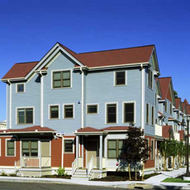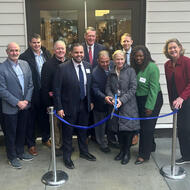Housing
The Mayor's Office of Housing is responsible for developing affordable housing, housing the homeless, and managing the City’s real estate. We also work to ensure that renters and homeowners can find, maintain, and stay in their homes.
Get Started
Get StartedCheck out our guide below that features our most frequently visited resources.
Learn more about the Mayor's Office of Housing
Find information on our programs, who we are, and what we strive for.
Housing Programs Income and Rent Limits
Income limits are based on household size and a percentage of the annual average income for the Boston area. These limits are set annually and subject to change. Housing programs qualify applicants based on their household income.
view the current INCOME AND RENT LIMITS
Searching for affordable housing? Check out Metrolist, Boston's best resource for income-restricted housing.
Upcoming Events
EventsInclusionary Zoning
Boston’s Inclusionary Zoning (IZ), first established in 2000 as the Inclusionary Development Policy and then updated and incorporated into the Zoning Code effective 2024, requires market-rate housing developments with seven or more units to support the creation of income-restricted housing, ranging from 15 to 17 percent of units, on site or else at a location near their building, plus three percent (3%) of units for voucher holders in large rental projects only. In some cases, developers may contribute to the Inclusionary Development Policy Fund in lieu of building income-restricted units. These funds are used by the City of Boston Mayors’ Office of Housing (MOH) to fund the creation of affordable/income-restricted housing across Boston.
IZ, which was announced in 2023, goes into effect in October 2024.
To learn more about the changes to the City of Boston policy, read the policy itself, or to find Inclusionary Zoning FAQs for developers, please click the button below.
BOSTON ACQUISITION FUND
Protecting Tenants, Preserving Long Term Affordability, Preventing Displacement
The Boston Acquisition Fund (BAF) is a public-private revolving loan fund established by Mayor Michelle Wu and a number of Boston institutions and philanthropies to tackle one of the city’s most pressing challenges: preserving housing affordability.
Administered by the Massachusetts Housing Investment Corporation, the BAF provides low-interest loans to mission-driven developers to purchase occupied multi-family housing in the city to protect current residents from displacement and stabilize communities affected by rising rents and speculative investment pressures. This fund is designed to protect and preserve long term affordability for tenants, fight displacement, and ensure Boston remains a home for everyone. As loans are repaid, funds are reinvested to support new housing acquisitions, creating a sustainable model for preserving affordability.
HUD Plans and Reports
Much of the funding that MOH oversees and administers comes from the federal government. The Grants Management division of Administration and Finance is responsible for all reporting and citizen participation planning about the uses for these funds.
The Grants Management Unit:
- prepares plans and reports required by the U.S. Department of Housing and Urban Development (HUD)
- assists with grant-writing
To learn more or to read the current reports, go to the Grants Management webpage.






